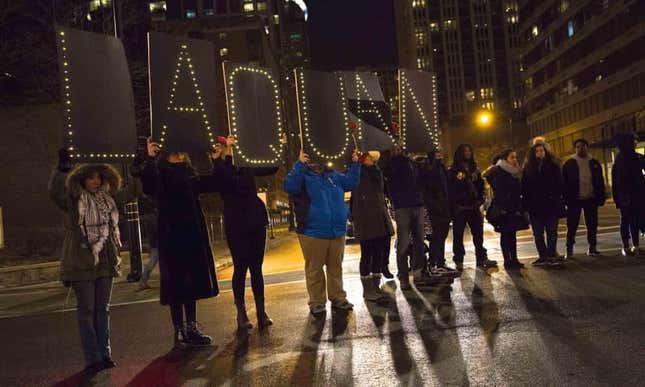
The former Chicago police officer who shot and killed 17-year-old Laquan McDonald has been released early from prison, only serving about half of his sentence, per the Chicago Tribune. Local activists, politicians as well as McDonald’s family have rallied and protested against the decision, reported The Guardian. The former officer’s 3-year-early release was decided on his “good behavior.”
Former cop Jason Van Dyke was convicted of the murder of McDonald in 2018 and sentenced to six years and nine months. In 2014, Van Dyke pursued McDonald after receiving calls of a teenager carrying a knife and damaging cars. Within six seconds of Van Dyke exiting his vehicle, he fired 16 shots at McDonald, all of which struck him while he walked away.
McDonald’s family and local activists expressed their anger over Van Dyke’s early release, keeping in mind the maximum sentence he could’ve served was 96 years, reported The Guardian.
From The Guardian:
In a press conference last Thursday held by McDonald’s relatives at a local church, his grandmother, Tracie Hunter, called Van Dyke’s punishment a “slap on the wrist”, according to the Chicago Tribune.
“I just want justice, the right justice,” Hunter said. “I’m not going to rest or be satisfied until this man does his rightful time.”
“It’s crazy how I go to a cemetery and talk to a tombstone while this man can talk to his wife and two kids,” said Tanesha Hunter, McDonald’s aunt, in a separate press conference on Monday.
Local activists held protests and a rally outside the home of Illinois governor JB Pritzker. One community organizer, William Calloway, told The Guardian Pritzker is just as accountable as the officers involved in McDonald’s death. Calloway cited five other victims of police shootings between 2011 and 2014. Pritzker said he was also disappointed in the outcome of Van Dyke’s early release.
“The justice system isn’t always just, and I do not think that the outcome of sentencing of Jason Van Dyke was proper. I am disappointed and I would have rather seen a different outcome. But this is where we are,” said Pritzker via The Guardian. However, some refused to settle for the shortened sentence and pushed for federal charges to be brought against Van Dyke.
From The Guardian:
The Reverend Jesse Jackson said he is also organizing a march for Thursday and has joined other organizers in calling for the justice department to pursue federal civil rights crimes against Van Dyke. A federal investigation was opened in 2015 but charges were never filed.
“We all know that 81 months is not enough to fully hold Van Dyke accountable and we know that there is a movement in this city. That is the reason why Van Dyke is behind bars, so we are reactivating that movement,” Jazmine Salas of the Chicago Alliance Against Racist and Political Repression, one of the organizations that signed a letter to the Department of Justice asking for federal charges, told WTTW.
Van Dyke’s early release also amplified the conversation on police accountability. Though Chicago had established a consent decree to mandate police reform, an investigation into the Chicago Police Department had exposed “execessive, racist force and widespread corruption,” reported The Guardian.
Mayor Lori Lightfood said the state of police reform and accountability in Chicago is not ideal but in a better place than it was two years ago before the work began. Jaime Kalven, the journalist who broke the story of McDonald’s murder, said our institutions have failed to rise to the challenge of true accountability.
“The verdict is far more important than the sentence, and I’m not sure we’d be in a different place as a city right now if Jason Van Dyke had gotten 12 years or 20 years,” said Kalven via The Guardian.
Van Dyke will serve three years of supervised release, reported the Chicago Tribune. Lightfoot shared a statement responding to his release.
“I understand why this continues to feel like a miscarriage of justice, especially when many Black and brown men get sentenced to so much more prison time for having committed far lesser crimes. It’s these distortions in the criminal justice system, historically, that have made it so hard to build trust,” read the statement via the Chicago Tribune.

